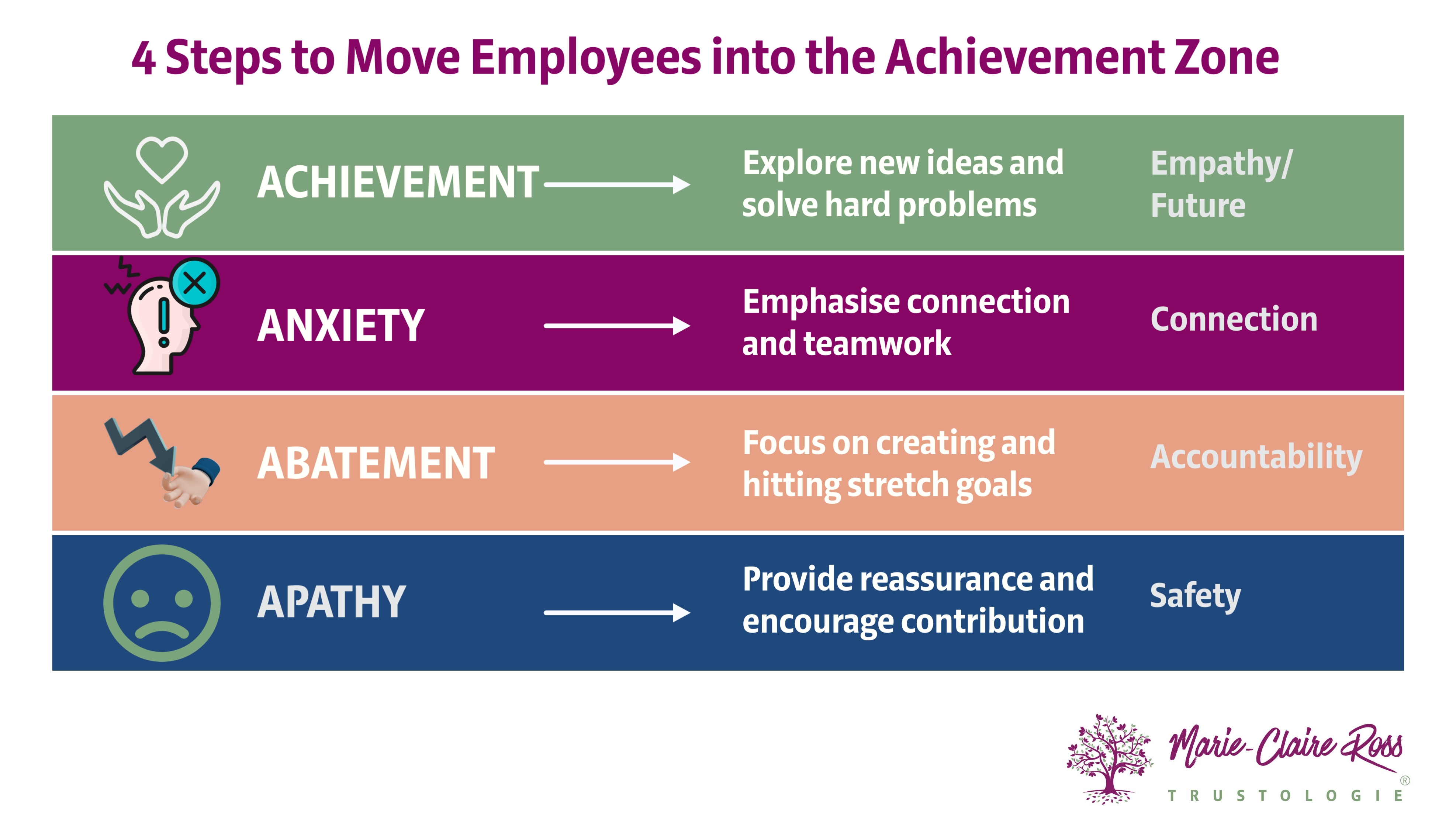11 min read
4 Practical Strategies for Better Emotional Management in the Workplace
I have a friend who often finds herself at the mercy of her emotions. Recently, she called me to rehash a confrontation she’d had with a group of...
Develop leaders, strengthen executive teams and gain deep insights with assessments designed to accelerate trust and performance.

Transform how your leaders think and perform with keynotes that spark connection, trust and high-performance cultures.

Explore practical tools, thought-leadership and resources to help you build trusted, high-performing teams.

Trustologie® is a leadership development consultancy founded by Marie-Claire Ross, specialising in helping executives and managers build high-trust, high-performing teams.

-1.jpg)
An interesting comment that I often get from leaders is that employee engagement results often don't explain team performance. Some teams have high employee engagement, but don't perform so well.
Typically, I consider these teams to be in the abatement zone, where performance is declining. These teams are stuck in a comfort zone. They are a great place to be if you don't like to challenge yourself.
-1.jpg?width=2312&name=Psychological-Safety-and-Accountability%20(1)-1.jpg)
But there is another team phenomena that's not so easily recognised.
Harvard Business Review published a study undertaken by Oracle and Engage for Success that found that many teams that appear engaged in employee engagement metrics may be less engaged than first thought.
Over a three-year period, research was undertaken with 41 work teams spanning nine industry sectors. The study found that one-third of teams fell into a category called pseudo-engaged. These teams appeared engaged both in surveys and in the eyes of management. Yet, on closer inspection exhibited some troubling signs of disengagement, such as antipathy toward colleagues and dishonesty to managers.
The gap in perceived and actual engagement levels was that these teams were made up of people who tended to be ambitious and highly engaged at an individual level. But not so engaged at the teamwork level. They really weren't that invested in their teams.
The study looked into teams at a hospital ward. One highly engaged team was motivated by a strong sense of purpose and commitment to high quality patient care. But this compassion didn't extend to their own colleagues. Team-based duties tended to be put on the low priority list. Nurses were reluctant to partner with each other to help prepare the ward for mealtimes or change a patient's bed linen.
Management had been oblivious to these problems because they focused on the teams successful engagement numbers, which omitted the measure of teamwork.
Focusing on employee engagement numbers alone can be perilous. They only tell one side of the story. Often, I get called in to companies with low employee engagement results, but HR are not sure why. Undertaking stakeholder interviews helps unpack what is really going on.
In my team zone model, teams that seem to be delivering well are usually found in the anxiety zone. This is where there is a lot of pressure to perform, but little incentive to work well with others. People often burn out and feel unsupported by their team members. Like the research found, it is where people are pseudo-engaged.
When there is an undue focus on individual results people are more likely to cheat, sabotage efforts or work around others. It is detrimental to productivity and wellbeing. As the team leader, it is your job to improve teamwork and role model the right behaviours.
Here are four steps to help you reorient your team on collective results rather than individual:
1. Introduce team metrics
When people are measured on their individual performance they will deliberately pursue personal gain at the expense of the team. Set targets and metrics at both the individual and team level. Explicitly name team duties in individual job descriptions.
If you team is measured on employee engagement, make sure that there is a teamwork question.
2. Communicate a team mantra
Repeat a phrase to help you team members remember to work together in team meetings. A mantra that I teach teams is: Team success is not about smart individuals, it's about teams working smarter together.
3. Create a team expectations document
A team expectations document outlines what is expected of each team member in terms of their behaviours, expectations and attitudes, in relation to building trust with each other and the organisation as a whole.
According to the book, The Speed of Trust by Stephen M. R. Covey, in every interaction – explicitly or implicitly, understood or not, there are expectations. And the degree to which these expectations are met or violated affects trust. In order to achieve results, you need to make sure that everyone is clear on what needs to be achieved and the related expectations. Doing this at the outset stops a lot of potential problems.
A team expectations document requires a bit of planning, but the idea is to produce a handful of expectations to run with that everyone understands and agrees upon. It is also worthwhile to include the team purpose and values to align everyone to the collective.
4. Reward collaboration
A Stanford study found that if people are obliged work collectively or if teamwork efforts aren't recognised by the team, it is unlikely to yield motivational benefits.
Actively reward and celebrate when team members collaborate well together.
Introduce a gratitude ritual into weekly meetings or even hand out gratitude cards to colleagues.
Leading a team requires ensuring that your team members really value the importance of teamwork. Help your team to prioritise collaboration through rewarding mutual support, shared responsibilities and values. This means helping them understand what that looks and feels like and what behaviours you expect.
Without this focus, tasks get done less efficiently and effectively. People forget about people. Setting expectations tied to trusting one another that are linked to your core values and purpose make it much easier to align thinking within your team. While it does take some planning, the result is a team that works well together reaching goals and enjoying each other’s company.

11 min read
I have a friend who often finds herself at the mercy of her emotions. Recently, she called me to rehash a confrontation she’d had with a group of...

9 min read
True leadership presence isn’t a performance or a set of charisma hacks; it is the felt experience of who you are being in the room. By cultivating...

13 min read
As teams return from their summer (or winter) break, you may notice subtle shifts in your team’s energy. Even if the end of year was positive, a new...
When it comes to safety -
.jpg)
Teams are where great work gets done.

Today’s fast-changing world features speed, complexity and dense interdependencies. The ability to problem solve and adapt in real time is critical,...